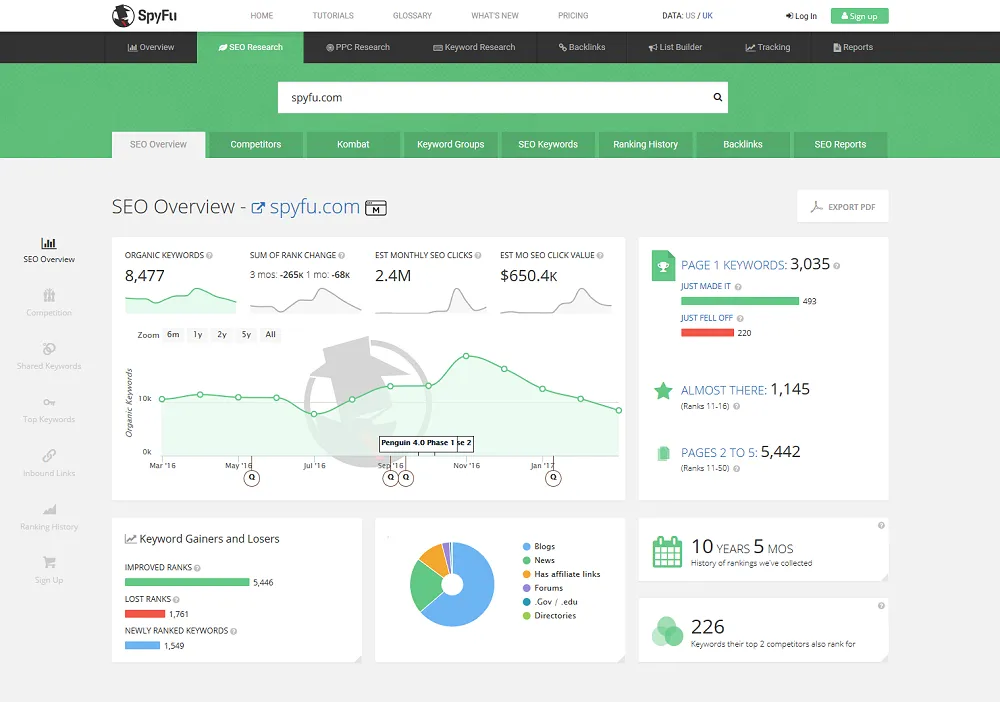With the right SEO tools in your arsenal, you can outrank competitors, drive targeted traffic, and skyrocket your online success. SpyFu and Semrush are two stand-out platforms for digital marketers, but how do they really compare?
In this comprehensive comparison, we'll pit these industry giants against each other, dissecting their features, pricing, and unique selling propositions. By the end, you'll have a crystal-clear picture of which tool aligns best with your SEO goals and budget.
We'll be evaluating these key aspects in the SpyFu vs Semrush comparison:
- Keyword research capabilities
- Competitor analysis features
- Backlink analysis and management
- Site auditing and technical SEO
- Pricing and value for money
Semrush and SpyFu: An Overview
What is Semrush?
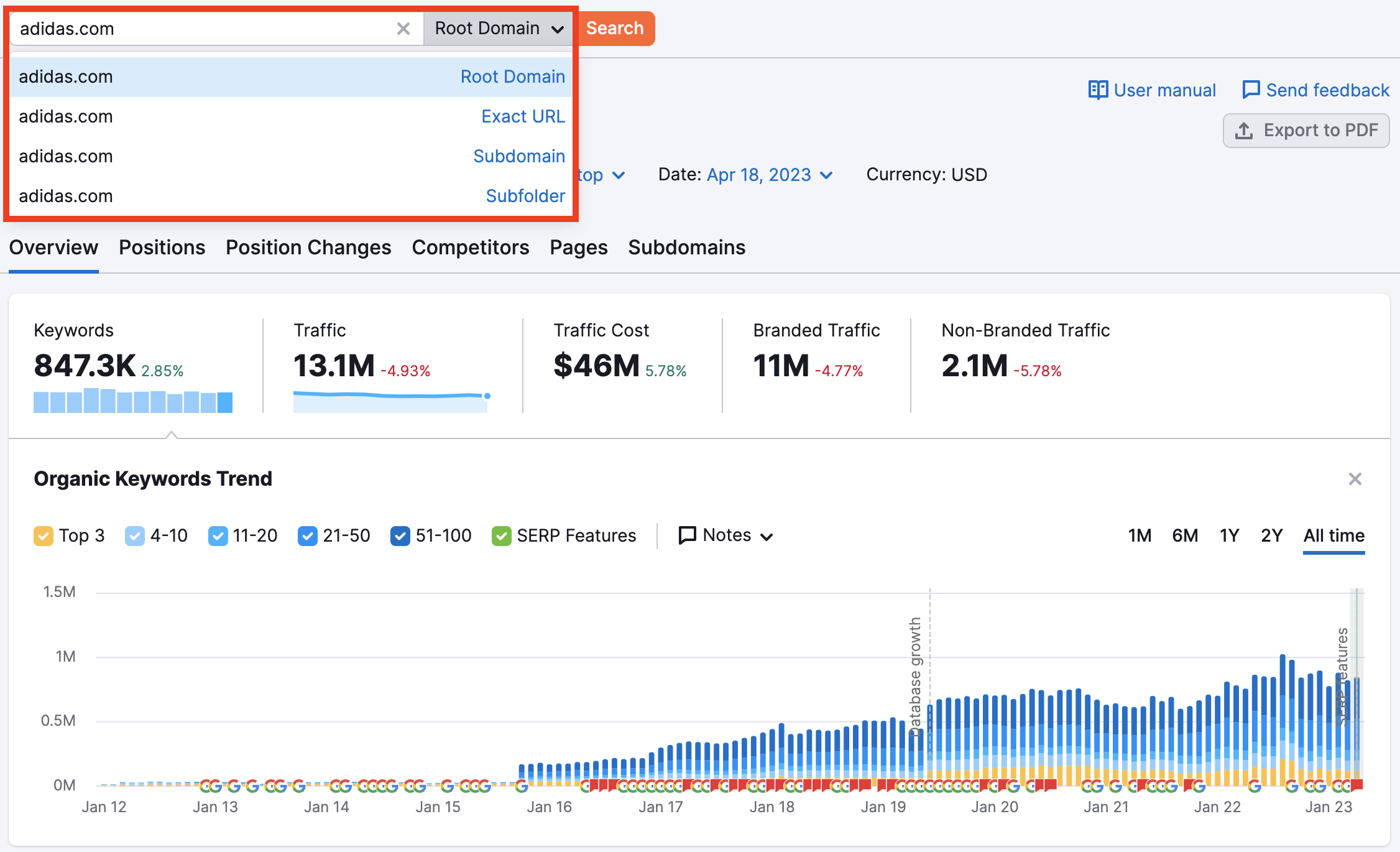
Semrush is an SEO and digital marketing platform that offers a smorgasbord of tools for keyword research, competitor analysis, site audits, rank tracking, and more. Its standout features include the Keyword Magic Tool, which generates thousands of long-tail keyword ideas, and the Position Tracking tool that monitors your rankings across multiple locations and devices.
Pricing: As of January 2025 Semrush offers three main plans - Pro ($139.95/month), Guru ($249.95/month), and Business ($499.95/month). They also have a custom plan for enterprises with specific needs.
You are limited by projects (5 on their Pro Plan, for example) that organize deeper research on the domains that you search. They describe it as a workspace for a particular domain or subdomain.
Ideal for: Digital marketers, SEO agencies, and larger businesses with diverse marketing needs.
What is SpyFu?
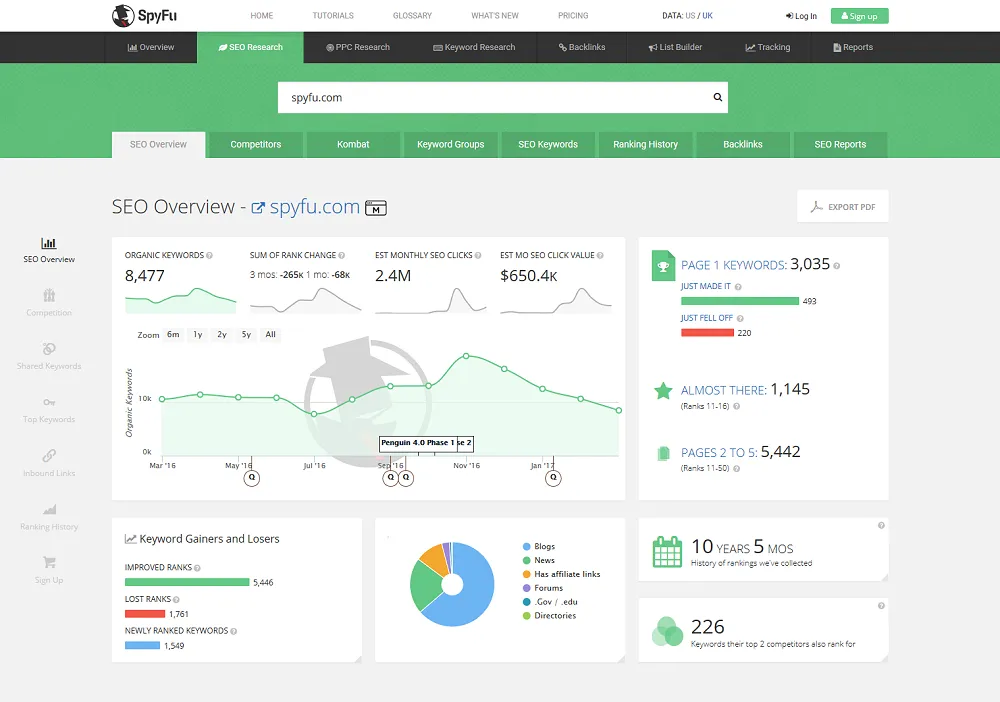
SpyFu is a powerful competitor research and keyword analysis tool that helps you reverse-engineer your rivals' SEO and PPC strategies. With SpyFu, you can uncover your competitors' top-performing keywords, analyze their ad copy, and identify untapped opportunities to outrank them. The tool's USP is its focus on delivering actionable insights to help you outsmart the competition.
Pricing: SpyFu keeps it simple with three plans - Basic ($39/month), Professional ($79/month), and Team ($299/month). All plans come with unlimited searches and unlimited results as well as a 30-day money-back guarantee.
Ideal for: Marketers, business owners, and freelancers who want to get the upper hand on competitors without breaking the bank.
Semrush vs SpyFu: A quick feature comparison
| Feature | Semrush | SpyFu |
|---|---|---|
| Keyword research | ✅ | ✅ |
| Competitor ad copy | ✅ | ✅ |
| Rank tracking | ✅ | ✅ |
| Site audit | ✅ | ❌ |
| Backlink analysis | ✅ | ✅ |
| PPC Research | ✅ | ✅ |
| Link building tools | ✅ | ✅ |
| Content optimization | ✅ | ✅ |
| Starting price | $139.95/mo | $39/mo |
Keyword Research: Semrush vs SpyFu
After Years of Competition: A Surprising Twist
SpyFu and Semrush are two of the most popular platforms for digital marketers, but how do they really compare? If your goal is to make data-driven decisions, SpyFu’s depth in SEO and PPC keyword data makes it the better choice. Here’s why it makes a difference:
Better Accuracy: 10x More PPC, 2x More SEO Data
One of SpyFu’s standout advantages is its sheer volume of data. Semrush had a longstanding reputation for its keyword depth, but a new look in 2025 uncovers a huge shift. SpyFu consistently tracks more keywords per domain, giving more accurate data on what a site ranks for and the Google Ads that it buys.
Across industries and website sizes, SpyFu offers 10x more PPC keywords and 2x more SEO keywords than Semrush.
A critical thinker might throw a flag here. Are they just loading up Amazon and eBay keywords to lift the count overall? Nope. In multiple comparisons in diverse industries, SpyFu’s data depth applies across the board. We saw this in sites like Hubspot, Angi’s List and Best Buy--but also in medium and smaller sites like grain.com and brothersplumbing.com.
Those larger sites offer impressive keyword counts, but better coverage for smaller websites helps agencies serve their clients better. Also, small business owners get a more useful tool to measure their competition as well as their own performance.
Small and Local Business Edge
SpyFu’s data depth particularly shines for small and local businesses. These businesses struggle with tools that prioritize large-scale data over helpful, localized insights. Our tests showed that SpyFu gives a more complete picture of the keywords these businesses rank for, ensuring you can identify opportunities and gaps in your strategy. Semrush’s limited data becomes more apparent when compared to SpyFu searches. It leaves local businesses to work with incomplete data, and that can lead to misleading signals.
This is important because a deeper keyword base means that SpyFu gives a more accurate view of a domain’s SEO and PPC performance. If you’re making business decisions from competitive research, be sure you’re getting a truer picture of what’s happening with a site—and your industry.
Semrush's Keyword Magic Tool and Keyword Overview

Semrush's Keyword Magic Tool is a powerhouse for discovering profitable long-tail keywords. Simply enter a seed keyword, and the tool will generate thousands of relevant keyword ideas, grouped by topic. You can then analyze each keyword's search volume, difficulty, CPC, and SERP features to cherry-pick the best opportunities.
The Keyword Overview tool provides a bird's eye view of any keyword, including its search volume trend, CPC distribution, top-ranking pages, and more. This helps you gauge a keyword's potential before investing time and resources into targeting it.
Pros:
- Extensive keyword database with accurate search volume data
- Intuitive keyword grouping and filtering options
- Useful keyword metrics like Keyword Difficulty and SERP Features
Cons:
- Can be overwhelming for beginners due to the sheer volume of data
- Some advanced features are locked behind higher-tier plans
SpyFu's Keyword Research Tool
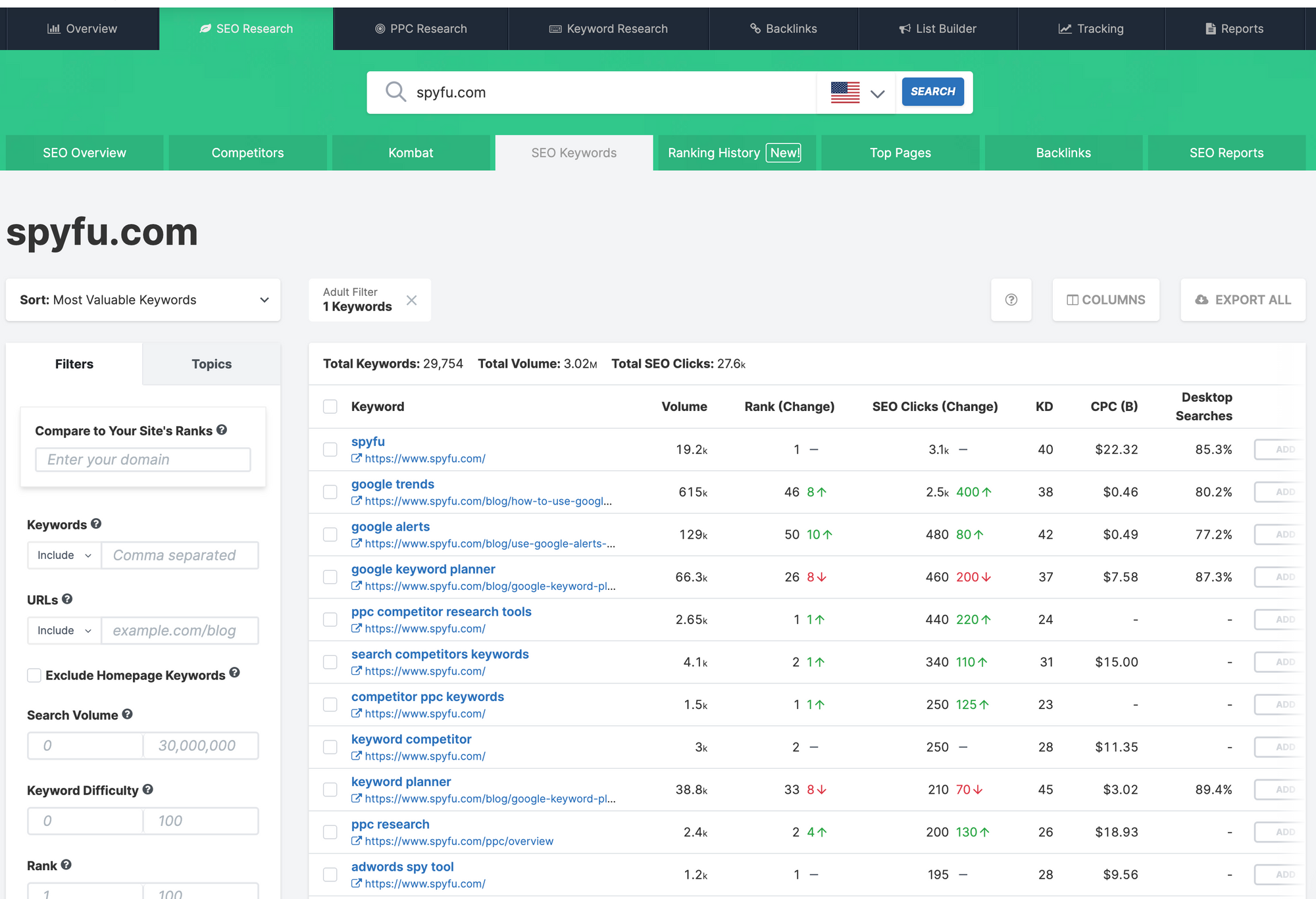
SpyFu's Keyword Research tool is a goldmine for uncovering competitors' top-performing keywords. Just enter a rival's domain, and SpyFu will reveal their organic and paid keywords, along with estimated monthly search volumes and ranking difficulty scores. You can then use these insights to inform your own keyword strategy and identify gaps in your competitors' SEO game.
SpyFu also offers a unique "Kombat" feature that lets you compare keyword data for up to three competitors side-by-side. This makes it easy to spot overlaps and untapped opportunities at a glance.
Pros:
- Laser-focused on competitor keyword research
- Intuitive interface with easy-to-understand data visualizations
- Unlimited searches on all plans
Cons:
- Lacks some of Semrush's advanced keyword analysis features
Which tool wins for keyword research?
Both Semrush and SpyFu offer robust keyword research capabilities, and they excel in different areas. Semrush offers all-in-one tool with advanced keyword analysis features and accurate search volume data. However, SpyFu's newer depth and breadth make it more reliable for assessing competitors and their true SEO or PPC footprint. All of that plus unlimited searches at a lower price point, and SpyFu is the way to go.
Verdict: SpyFu
Competitor Analysis: Semrush vs SpyFu
Semrush's competitive research toolkit

Semrush offers a comprehensive suite of tools for spying on your competitors' digital marketing strategies. The Domain Overview tool provides a snapshot of any domain's organic and paid search performance, traffic sources, and top content. You can then dive deeper with the Organic Research and Advertising Research tools to uncover your rivals' top keywords, landing pages, ad copy, and more.
Semrush also offers a handy "Keyword Gap" tool that lets you compare your site's keyword profile against up to four competitors. This helps you identify keyword opportunities you may be missing out on and spot gaps in your content strategy.
Pros:
- Comprehensive competitor analysis across SEO, PPC, and content marketing
- Useful "Keyword Gap" tool for comparative analysis
- Detailed insights into competitors' ad strategies
Cons:
- Steeper learning curve due to the breadth of features
- Some advanced features are only available on higher-tier plans
SpyFu's competitor research features
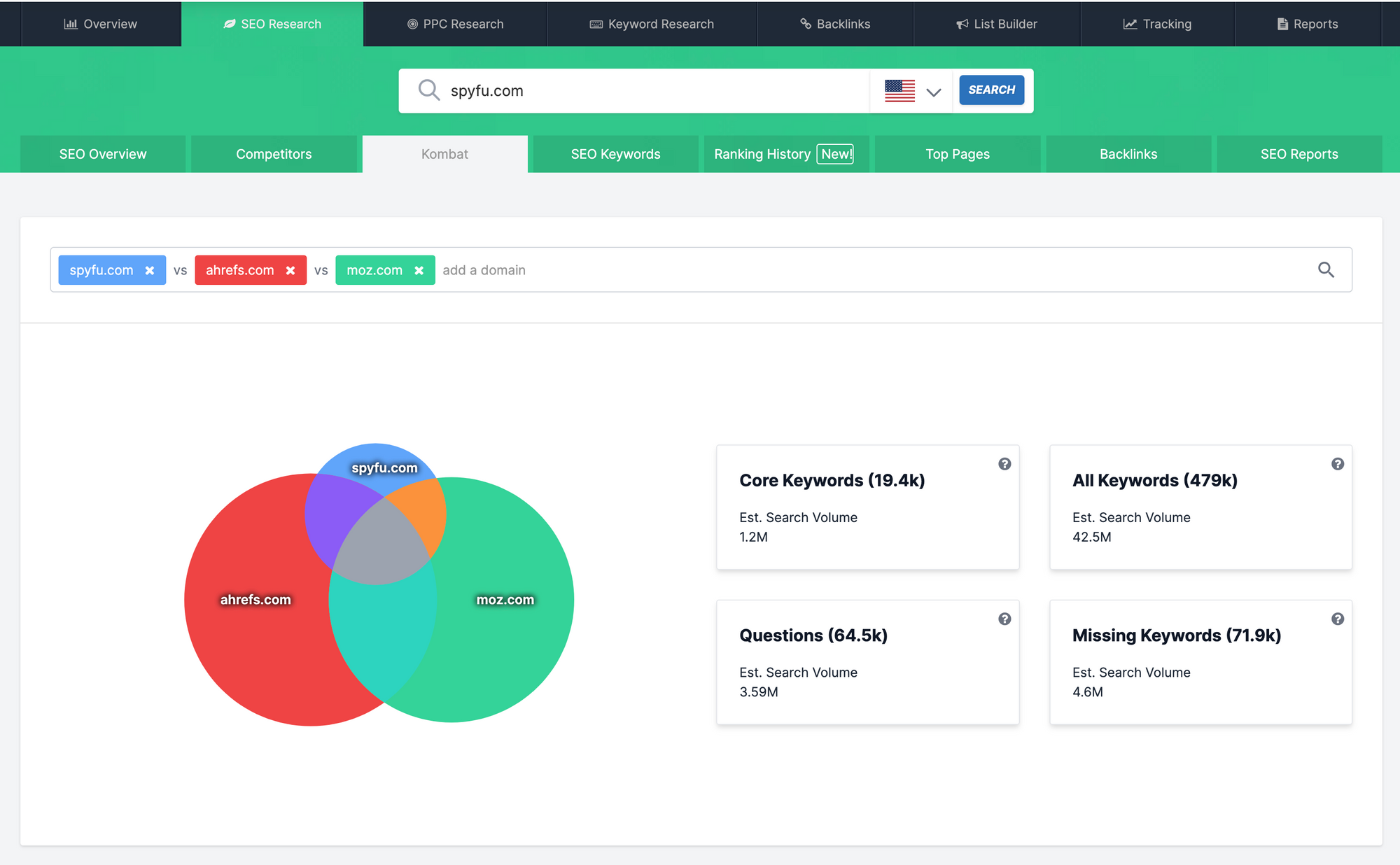
SpyFu is built from the ground up for competitor research, and it shows. The tool's main selling point is its ability to uncover your competitors' most valuable keywords, ads, and backlinks with just a few clicks.
One standout feature is SpyFu's "Kombat" tool, which lets you compare up to three competitors side-by-side across various SEO and PPC metrics. This makes it easy to identify overlaps, gaps, and opportunities to outflank your rivals.
SpyFu also offers detailed insights into your competitors' ad strategies, including their ad copy, targeting, and estimated monthly budget. You can use this intel to inspire your own ad campaigns and uncover profitable PPC keywords you may be overlooking.
Pros:
- Powerful competitor analysis features at an affordable price point
- Intuitive "Kombat" tool for side-by-side comparisons
- Detailed insights into competitors' PPC strategies
Cons:
- Focuses primarily on SEO and PPC (may not be ideal if you need a more holistic view of your competitors' marketing)
Which tool is better for spying on competitors?
When it comes to pure competitor research, SpyFu is a stronger choice. Its focus on reverse-engineering competitors' SEO and PPC strategies, combined with its intuitive interface and affordable pricing, make it the go-to tool for marketers looking to gain a competitive edge.
While Semrush offers a broader range of competitor analysis features, it may be overkill if your primary goal is to outrank rivals in search. SpyFu delivers the key insights you need to outsmart competitors without overwhelming you with extraneous data.
Verdict: SpyFu wins for competitor research
Semrush's Backlink Analytics and Backlink Audit tools
Backlink Analysis: Semrush vs SpyFu

Semrush offers a robust set of tools for analyzing and managing your site's backlink profile. The Backlink Analytics tool provides a detailed overview of your backlinks, including the referring domains, IP addresses, and anchor text distribution. You can also use it to spy on competitors' backlinks and identify link building opportunities.
The Backlink Audit tool, on the other hand, helps you identify and disavow toxic backlinks that could be harming your site's SEO. It automatically flags suspicious links based on various risk factors and lets you add them to a disavow file with a single click.
Pros:
- Comprehensive backlink analysis with useful metrics like Authority Score and Toxicity Score
- Helpful Backlink Audit tool for identifying and disavowing harmful links
- Integrates with Google Search Console for more accurate data
Cons:
- Backlink data may not be as extensive as specialized link analysis tools like Ahrefs or Majestic
- Backlink Audit is only available on higher-tier plans
SpyFu's Backlink Builder and Backlinks Outreach

SpyFu's Backlink Builder is a powerful tool for uncovering Google-indexed links that a competitor gets. It works by analyzing your competitors' backlinks and identifying the topically relevant linking sites that could link to you as well. In a twist from other backlink tools, SpyFu’s version jumps ahead to the “kingmakers,” that give link juice, not just the sites that get it. You can then reach out to these site contacts with personalized pitches and track your progress over time. The Backlinks Outreach tool shares the contact information of the key connections at those sites.
Also inside the tool, Backlink Kombat (a nod to SpyFu’s comparison feature) lets you compare any website’s backlink profile against competitors to find the ones that they don’t share. The objective is to single out link opportunities. While not as comprehensive as Semrush's Backlink Analytics, it still provides useful insights into a site's link building strategy and helps you identify potential links to chase.
Pros:
- Actionable insights for link building campaigns
- Useful competitive analysis features
- Affordable pricing with unlimited searches on all plans
Cons:
- Lacks some of Semrush's advanced backlink analysis features
- Not to be used as an audit tool
Which tool provides better backlink insights?
Semrush is the clear winner when it comes to backlink analysis. Its Backlink Analytics and Backlink Audit tools provide a more comprehensive view of your link profile and offer useful features for identifying and disavowing toxic links.
While SpyFu's Backlink Builder is a great tool for uncovering link building opportunities, it lacks the depth and breadth of Semrush's backlink analysis capabilities. If your primary goal is to improve your site's link profile and avoid penalties, Semrush is the way to go.
Verdict: Semrush wins for backlink analysis
Site Audits: Semrush vs SpyFu
Semrush's Site Audit tool

Semrush's Site Audit tool is a powerful weapon in any SEO's arsenal. It crawls your entire site and identifies technical issues that could be holding back your search performance, such as broken links, duplicate content, and slow page speeds. The tool then provides actionable recommendations for fixing these issues and improving your site's overall health.
One standout feature of Semrush's Site Audit is its integration with Google Analytics and Search Console. This allows the tool to provide more accurate insights into your site's performance and helps you prioritize fixes based on real-world data.
Pros:
- Comprehensive site auditing with 130+ technical SEO checks
- Intuitive interface with clear recommendations for improvement
- Integrates with Google Analytics and Search Console for more accurate insights
Cons:
- Some advanced features are only available on higher-tier plans
- Can be overwhelming for beginners due to the volume of data
Does SpyFu offer site auditing?
Unfortunately, SpyFu does not currently offer a dedicated site auditing tool. While the platform provides valuable insights into your competitors' SEO strategies, it lacks the technical SEO capabilities of tools like Semrush.
If you're looking to conduct in-depth site audits and identify technical issues holding back your search performance, you'll need to use a separate tool alongside SpyFu. Some popular options include Screaming Frog, DeepCrawl, and Sitebulb.
Which tool is better for technical SEO?
When it comes to technical SEO and site auditing, Semrush is the clear winner. Its Site Audit tool is one of the most comprehensive and user-friendly on the market, offering actionable insights for improving your site's health and search performance.
While SpyFu is an excellent tool for competitor research and keyword analysis, it simply doesn't offer the technical SEO capabilities that Semrush does. If you're serious about optimizing your site for search engines, investing in a dedicated site auditing tool like Semrush is a must.
Verdict: Semrush wins for technical SEO
Pricing and Value for Money
Semrush's pricing plans
Semrush offers three main pricing plans:
- Pro ($139.95/month): Includes all core features with limits on usage and users
- Guru ($249.95/month): Offers higher limits and additional features like historical data and API access
- Business ($499.95/month): Provides even higher limits, custom reporting, and access to all tools
While Semrush's pricing may seem steep compared to some other SEO tools, this covers some extended tools that enterprise customers would still want to add on separately. Semrush's platform aims to cover functions from keyword research to site audits to content marketing. For businesses with diverse digital marketing needs, investing in Semrush can actually save money compared to using multiple specialized tools.
SpyFu's pricing structure
SpyFu keeps things simple with three straightforward plans:
- Basic ($39/month): Includes unlimited searches, search results and data exports, 6 months of historical data, and 5k weekly tracked keyword rankings
- Professional ($79/month): Offers additional features like API access, custom reporting, and 15k weekly tracked keyword rankings
- Team ($299/month): Includes everything in the Professional plan plus 5 user logins and 40k weekly tracked keyword rankings
One of SpyFu's biggest selling points is its affordable pricing. Even the Basic plan offers generous access to all core features no caps on results, making it an excellent value for small businesses and solo marketers.
SpyFu's all-you-can eat approach carries across every plan. Subscribers have full access to search every domain and keyword unlimited times with unlimited results and unlimited exports.
Which tool offers the best bang for your buck?
The answer to this question depends on your specific needs and budget. If you're a larger business with diverse digital marketing needs, Semrush's all-in-one platform may be worth the investment. The tool's comprehensive feature set and seamless integration between different modules can save you time and money in the long run.
On the other hand, if you're primarily focused on competitor research and keyword analysis, SpyFu offers unbeatable value for money. SpyFu offers unlimited access to keyword data, searches, and downloads. In contrast, Semrush’s higher-tier plans impose caps that limit your ability to extract the insights you need.
For marketers managing tight budgets, the cost savings with SpyFu are significant. Every dollar saved can be reinvested into ad spend, content creation, or other growth strategies, maximizing ROI. This makes SpyFu an excellent choice.
Verdict: SpyFu offers better value for most users
Expert Tips for Getting the Most Out of Semrush and SpyFu
Power tips for using Semrush like a pro
Uncover long-tail keyword opportunities.
Use the Keyword Magic Tool to filter by search intent, SERP features, and other criteria to find keywords that align with your content goals.
Set up regular site audits
Use Semrush’s toolset to monitor your technical SEO health over time. Its integration with Search Console allows you to blend your insights together to get more its features like the Backlink Audit and “My Reports.”
Add an SEO checker to your writing process
Semrush offers an SEO Writing Assistant that gives you immediate feedback on your writing that’s in progress. This might include specific notes on when to add more keywords, or it applies more widespread to the readability of the page.
Power tips for using SpyFu like a pro
Personalize your home page by saving a domain.
If you add a website as a project—SpyFu suggests your own site or your clients—you’ll get a handy way to jump into all of your research. Your customized homepage includes built-in shortcuts and recommendations that don't appear anywhere else on the site.
Not only is this a time-saver, but it opens up insights you might not have known you could get so easily. This includes keywords where a competitor just surpassed you, content topic ideas, and PPC keyword recommendations.
This also saves top competitors in one spot. Use it for reference or to open more findings. This might be keywords they have that you don’t rank for, their best performing content, or their best ad copy.
Dig into Ranking History
SpyFu power users love using its Ranking History feature to find a website’s ranking from any point in time. You can drill into your own site’s past or your competitor’s site. Both approaches allow for tactical digging into the past to help make decisions about your current and future work.
When your website shows a drop in traffic, you can look back at where your ranks showed the biggest change. It’s hard to do that in real time, so this lets you pinpoint when things changed so you can align that with updates or adjustments that you made.
Looking at your competitor’s past ranks is helpful when you are gauging their content. The past history offers more context. Is this page newly ranked, or has it been sitting in one spot and starting to decay?
Pull a Competitor’s Top Pages
Both Semrush and SpyFu started with competitor keywords. That explains which keywords bring in traffic, but the Top Pages feature in SpyFu shows you which pages earn the most SERP clicks for your competitors.
Build comparisons—from keywords to ranks to links
Look for the comparison opportunities inside of SpyFu. One hidden gem lets you compare your ranks—on a keyword by keyword basis—to a competitor’s individual organic keywords. This “compare to your site’s ranks” filter inside of the SEO Keywords feature also separates significant keywords on demand, like the ones where they outranked you.
Other tools like Kombat and Backlinks include similar filters to compare against specific websites so you can see keywords multiple competitors in a niche are all buying, or backlinks they get that don’t link to you.
Conclusion
After thoroughly testing Semrush and SpyFu, it's clear that both tools have a lot to offer SEOs and digital marketers. Semrush is the more comprehensive and feature-rich platform, but that comes at a steep price. This might be more advantageous for businesses that are trying to narrow their toolset but still have budget to dish out more expensive options.
SpyFu is a solid affordable option for domain research and rank tracking, and Semrush aims to justify its higher price point with:
- The largest keyword database of over 20 billion terms
- Extensive backlink data with auditing and link building features
- Sophisticated competitor and SERP analysis tools
- Robust site auditing and position tracking capabilities
- A full content marketing and social media toolkit
- Best-in-class support and educational resources
However for core features like competitor research and rank tracking, SpyFu delivers excellent bang for your buck. I especially like its Kombat tool for domain comparisons and the unique ranking history data.
